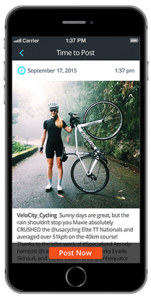A student’s perspective provides a fresh reminder of what social media is all about.
Social Media Marketing is one of the most difficult classes I have ever taught.
And, many of my students say it is one of the most difficult classes that they have ever taken.
Keeping up with the constant changes in social media platforms and tools takes a lot of time, patience, and trial-and-error.
The textbooks are always out-of-date. Platforms change in the middle of the semester (LinkedIn made a major overhaul during this semester).

Social media marketing students at the University of Northern Colorado remind you to go back to the basics.
And, developing a personal branding strategy, setting up 6 major social media platforms, and finding plenty of career focused evergreen content to social share is not an easy task for students while also taking 5+ other University courses required for a marketing or business major.
Nonetheless, my students and I see social media as worthy.
The assignment: learn to use real-world real-time social media for personal branding and job search.
The primary platforms: LinkedIn, Twitter, and WordPress blogging. The secondary platforms: Google+, Facebook Like Page, and Business Pinterest or a YouTube Channel. The tools: Hootsuite (certification required), Klout, Feedly, Canva, and Adobe Spark Post.
Yes, these marketing and business students at the Monfort College of Business at the University of Northern Colorado had many lessons to learn.
Students Speak Social.
Each Spring semester, at the end of my Social Media Marketing class, I ask my students to write a blog post about what they have learned from using social media for personal branding and their career.
Here are a few of their responses:
Personal Branding is Not Easy.
“During the Social Media Marketing course, I learned how important social media is for building my personal brand for my future career. It is not something you can do within couple of days. I realized that you need to work hard and that it takes time. You must keep posting, sharing, commenting and liking every day.” ~ Anna-Marie Plechata, @AnnaPlechata
Google Your Resume Name.
“At the beginning of the semester, I had to Google search the name I used on my resume. This was very important for me to do right away because it showed me what others are seeing when they searched for me on Google. From this, I made a goal of what I wanted people to see at the end of the semester. I didn’t want people seeing my personal pages on Facebook and Twitter. I wanted my search results to be more professional for future employers to see; I wanted to have a professional personal brand. If I had not have done that first Google Search, I would not have known what I needed to do to create a professional identity on the internet.” ~ Mikayla Culwell, @MikaylaACulwell
Consistency is Strategic.
“Creating your personal brand is only part of the strategy. The other part, which is easily overlooked, is keeping everything consistent. With your social profiles, this means that your taglines, background images, your keyword career focus, and links to other profiles should be complete and consistent. With your social sharing, this means posting with a consistent format, and in general, posting consistently. At least once a day is a good start, and your social medial tools such as Hootsuite or Buffer can help.” ~ Angelica Sena, @AngelicaC_Sena
A PLN is Everything.
“There is nothing worse than knowing that you need to share a post and not having any relevant content to share. In order to solve this problem, it is essential that you set up a strong PLN, also called a Personal Learning Network. A PLN is the finding, collecting, and organizing of career relevant content that you can social share from high quality sources. My preferred PLNs are with the use of Feedly and Twitter lists. Both are great tools for setting up a strong PLN so you constantly have quality, career relevant information to share with your audience.” ~ Madison Marrs, @MadisonMMarrs
Social Media is Another Way to Learn.
“Before this class, I knew social media was a way to connect with people, but I did not realize it was also a learning tool. Social media can be one of the best ways to learn because I was able to find and organize content that was suitable for the knowledge I wanted to gain. I plan on using Feedly more in the future for continued learning about the various subtopics of Marketing because I have created folders that contain quality content. Also, engaging with connections can be helpful because their content is of quality as well. Therefore, it is important to follow like-minded and near-minded individuals.” ~ Haley Sternberg, @haleycsternberg
Post Evergreen Content.
“To build a personal brand that is respected and allows potential hiring decision makers to view you as someone who is well informed in his/her career field, you must post relevant content. Posting content that is relevant and informative that pertains to your career interests showcases that you are in the loop and have done your homework on the career and industry you are wanting to enter. This shows others that you know what you are talking about and that you could prove to be a vital asset for a company.” ~ Brian Carroll, @BrianGrgCarroll
Engagement is Key.
“A key part of social media is engagement, and engagement is a two-way street. A person should properly engage with their connections to gain engagement from them. If a person just posts content to their own page or profile, but never does anything else, they will not gain engagement. They should share content, but also like, comment, and share others’ content as well.” ~ Allyson Dotson, @AllysonMDotson
Add Value with Comments.
“This was something that I learned over the semester and something that I think is very valuable to any social media account. When you see something of career value, something inspirational, something that can be used in the future, don’t just like it. Add to it. Comment and share about how much you enjoyed it. Don’t just be a fly on the wall. Be a social media lion. Devour every good share, every nice quote graphic, and every funny retweet, and then let them know that you enjoyed it greatly.” ~ Tanner Freauff, @tanner_freauff
Be Human.
“Make sure you are an authentic person. People like interacting with someone with a real personality. Include personality tweets and other funny little traces of your personality whenever you can. People don’t like social media robots and if you don’t have an authentic engagement with people, nobody will interact with you.” ~ Alexander Heitman, @AlexCHeitman
Be Authentic.
“People don’t want to follow a robot. Don’t just copy and paste links and tweet them out. Find something valuable in every blog post and add a relevant comment. Show your followers what you are really about. Some of my most successful posts were of my most sincere moments (such as my LinkedIn post about studying in the hotel lobby). People love to see that you can achieve success in your career while doing normal human things.” ~ Baile Winslow, @BaileWinslow
Bonus: Let the Little Wins Keep You Going.
“It is important to keep the social going. Now that the semester is over, I will not abandon my social media accounts or forget all the important things I have learned. I believe that the continuation of what I have learned will take me far. I have already received such amazing support, feedback, and “little wins” that it would be crazy to stop now. The growth in understanding and using social media that I’ve had these past 16 weeks is tremendous.” ~ Aaron Zimola, @AaronZimola
The Take-Away.
As the platforms and tools of social media continue to grow and evolve, it is difficult to keep up with all the changes.
However, sometimes it is good to go back to the basics. The basics of why and how to be human, social, and add value for your connections should remain constant.
You can learn a lot from my social media marketing students.
I did.
These are my students’ thoughts and now they are yours.
When it comes to the basics and principles, what else can you recommend to students and those new to social media and personal branding?
Please comment. We truly want to know what basic lessons you have learned and can share with us.
Image credit: Denny McCorkle
This article originally appeared on Digital Self Marketing Advantage and has been republished with permission.
Digital & Social Articles on Business 2 Community(28)




